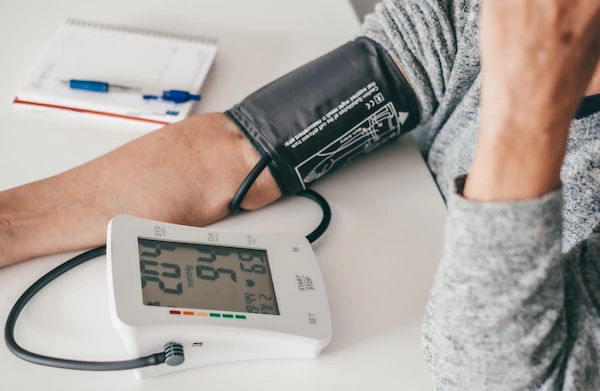Guide to Link Between Sugar And High Blood Pressure
Discover the surprising link between sugar consumption and high blood pressure. Learn how reducing your sugar intake can help manage and prevent hypertension in this comprehensive guide.

Written by Dr. J T Hema Pratima
Reviewed by Dr. Rohinipriyanka Pondugula MBBS
Last updated on 13th Jan, 2026

The Sweet Danger: Uncovering the Sugar and High Blood Pressure Link
Introduction
For decades, we’ve been told that sodium is public enemy number one when it comes to high blood pressure. But what if another common pantry staple is playing an even more significant role? Mounting scientific evidence is revealing a powerful and direct link between sugar consumption and the development of hypertension. This isn't just about the sugar you spoon into your coffee; it’s about the hidden sugars lurking in processed foods, sauces, and especially sugary beverages. This link between sugar and high blood pressure is mediated through complex processes like insulin resistance, inflammation, and disrupted mineral balance in the body. Understanding this connection is crucial for taking proactive control of your cardiovascular health. This article will demystify the science, explore the research, and provide you with practical, actionable steps to reduce your sugar intake and protect your heart.
How Sugar Directly Influences Your Blood Pressure?
The journey from consuming a sugary drink to seeing higher numbers on a blood pressure monitor involves several key physiological pathways. It's not just about empty calories; it's about how sugar actively disrupts your body's normal regulatory systems.
The Insulin Resistance and Blood Pressure Connection
When you consume high amounts of sugar, especially fructose, your body requires more insulin to manage the resulting spike in blood glucose. Over time, cells can become resistant to insulin's effects. This insulin resistance is a cornerstone of metabolic syndrome, a cluster of conditions that includes high blood pressure. Insulin itself can cause the kidneys to retain more sodium. This increased sodium retention leads to greater fluid volume in the bloodstream, which directly elevates blood pressure. Furthermore, insulin resistance can impair the function of the endothelium (the lining of blood vessels), reducing its ability to produce nitric oxide, a compound that helps blood vessels relax and dilate.
The Sodium Potassium Pump Disruption
Your body relies on a delicate balance of sodium and potassium to maintain proper fluid balance and nerve function. This balance is managed by a mechanism called the sodium/potassium pump. Excessive sugar intake, particularly fructose, can disrupt this vital pump. Research suggests that fructose can increase the reabsorption of sodium in the kidneys, similar to how table salt does. This leads to fluid retention and increased blood pressure. Simultaneously, a high sugar diet is often low in potassium—a mineral essential for counteracting the effects of sodium and relaxing blood vessel walls. This double whammy of increased sodium effect and decreased potassium efficacy significantly contributes to hypertension.
Consult a General Physician for the best advice
Sympathetic Nervous System Overdrive
Your sympathetic nervous system is responsible for your "fight or flight" response. Studies have shown that sugar consumption can activate this system, leading to an increase in heart rate and blood pressure. It causes the blood vessels to constrict, forcing the heart to work harder to pump blood throughout the body. This acute stress response, when triggered repeatedly by chronic high sugar intake, can lead to sustained high blood pressure.
Sugar vs. Salt: Which is the Bigger Villain for Hypertension?
The classic advice for managing high blood pressure has always been to put down the salt shaker. However, recent research is shifting this paradigm. While excessive sodium is certainly a contributor, a growing body of evidence suggests that sugar, particularly added sugars, may be equally—if not more—detrimental to blood pressure levels.
A major review of literature published in Open Heart journal concluded that sugar’s impact on blood pressure is actually more pronounced than that of sodium. The mechanisms are different: salt primarily affects blood volume, while sugar affects vascular resistance, insulin levels, and the sympathetic nervous system. For many individuals, especially those with insulin resistance, reducing sugar intake can lead to more substantial improvements in blood pressure readings than reducing sodium alone. This isn't to say you should ignore salt, but rather that a dual approach—vigilantly cutting back on both added sugars and sodium—is the most effective strategy for cardiovascular health.
Not All Sugars Are Created Equal: Added Sugar vs. Natural Sugar
It's critical to distinguish between the sugars that are harmful in excess and those that are part of a healthy diet. Natural sugars are those intrinsically found in whole foods like fruits (fructose) and milk (lactose). These come packaged with fiber, antioxidants, vitamins, and water, which slow down absorption and prevent the damaging spikes in blood sugar and insulin associated with processed sugars.
The real culprits are added sugars. These are sugars and syrups that are added to foods or beverages when they are processed or prepared. This includes table sugar, high-fructose corn syrup, honey, maple syrup, and agave nectar. They are commonly found in:
Sugarsweetened beverages (sodas, energy drinks, sweet teas)
Candy, cakes, and cookies
Flavored yogurts
Breakfast cereals
Granola and protein bars
Pasta sauces and ketchup
The body metabolizes these concentrated sugar sources rapidly, leading to the harmful effects described above.
The Proof is in the Pudding: Key Research and Studies
The link between sugar and high blood pressure is not just theoretical; it's backed by solid scientific evidence.
The Framingham Women’s Health Study: Found that drinking just one sugary soda per day was associated with higher blood pressure levels.
A study in Hypertension: Reported that reducing sugar-sweetened beverage consumption by one serving per day was linked to a drop of 1.8 mm Hg in systolic blood pressure over 18 months.
Research in The Journal of the American Society of Nephrology: Detailed how fructose metabolism in the liver leads to the production of uric acid, which can inhibit nitric oxide in blood vessels, leading to increased pressure.
These studies, among many others, consistently point to a dosedependent relationship: the more sugar consumed, the greater the risk of developing hypertension.
Hidden in Plain Sight: Identifying Sneaky Sources of Sugar
Reducing your sugar intake starts with knowing where to find it. Many "healthy" foods are loaded with added sugars.
How to Read Nutrition Labels Like a Pro?
1. Check the "Added Sugars" Line: This is the most important number on the label. The American Heart Association recommends no more than 36 grams (9 teaspoons) of added sugar per day for men and 25 grams (6 teaspoons) for women.
2. Scan the Ingredient List: Sugar has over 60 different names. Watch out for: sucrose, high-fructose corn syrup, barley malt, dextrose, maltose, rice syrup, and anything ending in "ose."
3. Beware of "LowFat" Products: Often, when fat is removed, sugar is added to compensate for flavor.
Taking Control: Practical Steps to Reduce Your Sugar Intake
Kicking the sugar habit is challenging but immensely rewarding for your blood pressure and overall health.
Smart Swaps: Healthier Alternatives to Satisfy Your Sweet Tooth
Instead of soda: Switch to sparkling water with a squeeze of lemon or lime.
Instead of sugary cereal: Opt for plain oatmeal topped with fresh berries and a sprinkle of cinnamon.
Instead of flavored yogurt: Choose plain Greek yogurt and add your own fruit.
Instead of candy: Reach for a piece of whole fruit or a small handful of nuts.
The Role of a Balanced Diet and Regular Exercise
Adopting a heart healthy diet like the DASH (Dietary Approaches to Stop Hypertension) diet, which is rich in fruits, vegetables, whole grains, and lean proteins and low in saturated fat and added sugars, is incredibly effective. Regular exercise helps improve insulin sensitivity, allowing your body to use sugar more effectively, which indirectly helps manage blood pressure. If you are struggling to make these dietary changes or your blood pressure remains high despite lifestyle modifications, consulting a doctor online with Apollo24|7 can help you create a personalized and sustainable plan.
Key Takeaways and Quick Facts
Sugar contributes to high blood pressure through insulin resistance, sodium retention, and nervous system activation.
Added sugars in processed foods and drinks are the primary concern, not natural sugars in whole fruits.
Evidence suggests sugar may be as significant a driver of hypertension as salt.
The American Heart Association recommends limiting added sugar to 25g (women) and 36g (men) per day.
Reading nutrition labels for "Added Sugars" is the first step to reducing intake.
Swapping sugary items for whole foods and adopting a balanced diet like DASH are effective strategies.
If your blood pressure does not improve with lifestyle changes, book a physical visit to a doctor with Apollo24|7 for a comprehensive evaluation and potential medication management.
Conclusion
The evidence is clear and compelling: the link between sugar and high blood pressure is a critical piece of the cardiovascular health puzzle. By understanding how added sugars disrupt our body's delicate systems—from insulin function to mineral balance—we empower ourselves to make better choices. Moving beyond the outdated focus on salt alone allows for a more effective, holistic approach to managing hypertension. It requires vigilance in reading labels, creativity in the kitchen, and a commitment to choosing whole, unprocessed foods. Your heart health is profoundly influenced by what’s on your plate and in your glass. Start today by cutting back on one source of added sugar; your blood pressure will thank you for it.
Consult a General Physician for the best advice
Consult a General Physician for the best advice

Dr. Aakash Garg
Gastroenterology/gi Medicine Specialist
12 Years • MBBS, DNB (Medicine), DrNB (Gastroentrology).
Bilaspur
Apollo Hospitals Seepat Road, Bilaspur
(150+ Patients)

Dr. S Vijayaraghavan
General Physician/ Internal Medicine Specialist
31 Years • MD (Gen. Med.)
Chennai
Apollo Speciality Hospitals OMR, Chennai
(175+ Patients)

E Pradheep
General Physician/ Internal Medicine Specialist
38 Years • MBBS
Bengaluru
Apollo Clinic, Sarjapur Road, Bengaluru

Dr. Sumanjita Bora
Cardiologist
9 Years • MBBS, PGDCC
Bengaluru
Apollo Clinic, Sarjapur Road, Bengaluru

Dr. Anindita Mondal
General Physician/ Internal Medicine Specialist
8 Years • MBBS
Kolkata
VDC Clinic, Kolkata
More articles from High Blood Pressure
Frequently Asked Questions
1. Does cutting out sugar lower blood pressure?
Yes, significantly. Reducing your intake of added sugars can lead to improvements in insulin sensitivity, reduce fluid retention, and lower vascular resistance, all of which contribute to lower blood pressure readings, often within a few weeks.
2. How much sugar per day is safe if I have high blood pressure?
It's best to adhere to the American Heart Association's guidelines: no more than 25 grams (6 teaspoons) of added sugar per day for women and 36 grams (9 teaspoons) for men. However, for optimal health, aiming even lower is beneficial.
3. Are artificial sweeteners a good alternative for blood pressure?
The research is mixed. While they provide sweetness without calories or blood sugar spikes, some studies suggest a potential link between long-term artificial sweetener use and an increased risk of hypertension and metabolic disorders. It's best to use them in moderation and focus on reducing overall sweetness preference.
4. Can fruit cause high blood pressure because of its sugar?
No. The sugar in whole fruit is natural and comes with fiber, which slows its absorption. The benefits of the vitamins, minerals, and antioxidants in fruit far outweigh any concerns about its natural sugar content for the vast majority of people.
5. What are the first signs of too much sugar?
Beyond weight gain, early signs can include constant cravings for sweet foods, energy crashes and fatigue, bloating, skin issues like acne, and of course, elevated blood pressure readings.
If you're experiencing persistent symptoms, a doctor from Apollo24|7 can help determine if they are diet-related.




.webp)